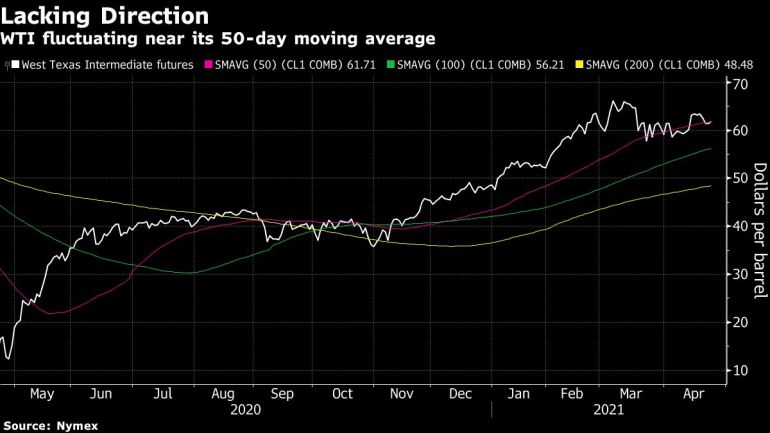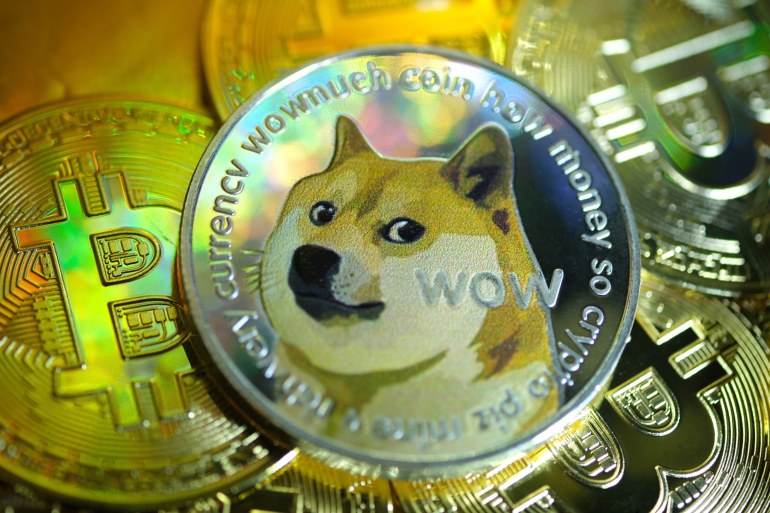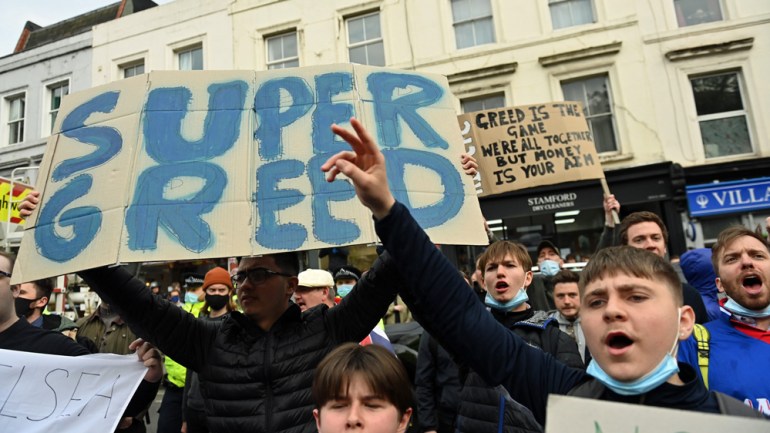Climate action, India’s COVID surge and a Super League red card
It has been a dizzying week of news; some of it hopeful – including promises by the world’s top polluters to slash carbon emissions.
There have also been some tragic developments in India. This week marked a significant worsening of the spread of COVID-19 there.
But some of this week’s stories have been downright farcical. For instance, a proposed multibillion-dollar breakaway European football league has scored an embarrassing own goal.
And then, there was the Dogecoin roller coaster and a son being ordered to pay his mum $100m.
So, if you have been too busy to absorb the details of all that has been going on, here are the numbers you need to know.
50 percent
The amount by which the United States – the world’s second-biggest emitter of greenhouse gases after China – promised to reduce its atmospheric carbon output by 2030 compared with 2005 levels.
The aggressive commitment came at a two-day summit called by US President Joe Biden beginning on Thursday, Earth Day.
“Time is short, but I believe we can do this,” Biden said in his opening remarks. “We will do this.”
Chinese President Xi Jinping did not offer a new emissions goal, saying instead China expects its carbon emissions to peak before 2030 and the country will achieve net zero emissions by 2060.
You can read more details of the Earth Day summit in Ben Piven’s story here.
55 percent
This is the even more aggressive cut in greenhouse gas emissions proposed by representatives of European governments and the European Parliament a day before Biden’s summit.
Under a proposed so-called European Climate Law, the bloc will consider reducing emissions by this amount by 2030 compared with 1990 levels. A raft of related legislation could transform the region’s economy.
332,730
The number of new COVID-19 infections reported by India on Friday, a grim new daily global record.
India has been battling a surge in new coronavirus cases and deaths in recent days as hospitals run out of space and vital resources such as oxygen. A doctor at a government-run hospital in the capital, New Delhi, told Al Jazeera that the latest wave of COVID-19 infections was like a “tsunami”.
You can read about how the surge in COVID-19 is likely to affect India’s economic recovery in Megha Bahree’s Short Answer explainer here.
Meanwhile, India’s worsening health crisis has been reverberating through the world’s energy markets. The price of US crude oil looked set for a weekly drop of about two percent as investors brace for a fall in energy demand as parts of India shut down to rein in the spread of the virus. India is the world’s third-largest oil importer.
 [Bloomberg]
[Bloomberg]$6.5m
The amount of money raised in one day earlier this month from the sale of jade and gems at an annual fare in Myanmar, according to local media.
 Miners search for jade stones at a mine dump at a Hpakant jade mine in Kachin state. The industry is controlled by the military and residents are left to scavenge from the world’s richest deposits of the luminous green stone [FIle: Soe Zeya Tun/Reuters]
Miners search for jade stones at a mine dump at a Hpakant jade mine in Kachin state. The industry is controlled by the military and residents are left to scavenge from the world’s richest deposits of the luminous green stone [FIle: Soe Zeya Tun/Reuters]The country’s military, which seized power from the civilian government on February 1, has long dominated Myanmar’s jade industry and continues to rake in immense profits, write Emily Fishbein, Nu Nu Lusan and Zau Myet Awng.
In 2015, the environmental watchdog Global Witness valued Myanmar’s jade industry at $31bn and described it as possibly the “biggest natural resource heist in modern history”.
A miner in Kachin state’s Hpakant township, which has the world’s largest and most lucrative jade mines, described an atmosphere of fear as security forces step up patrols of the compounds.
“I have seen many zombie movies, but never realised that I would be living in a similar environment,” he said. “People don’t go out at all unless they have to.”
$51bn
The estimated peak market value scaled this week by Dogecoin, the cryptocurrency with a Shiba Inu dog as a logo. It started out as something of a parody of Bitcoin in 2013, but now has some serious supporters including billionaire technology entrepreneur Elon Musk.
 Once a joke, investors are starting to take Dogecoin more seriously after a sharp rise in its value [File: Yuriko Nakao/Getty Images]
Once a joke, investors are starting to take Dogecoin more seriously after a sharp rise in its value [File: Yuriko Nakao/Getty Images]After rising by as much as 400 percent in a matter of days, its market value briefly exceeded that of car giant Ford and food processing conglomerate Kraft Heinz.
It later retreated by about 20 percent, losing roughly $10bn of its value.
Why is it so popular? Many analysts see it as another example of overly exuberant investors in search of substantial returns in obscure niche markets compared with those in more established assets such as blue-chip stocks or bonds.
$100m
The amount of money a London court has ordered a son to pay his mother at the centre of the United Kingdom’s largest divorce case.
Temur Akhmedov worked with his billionaire father, Farkhad Akhmedov, to do “all he could” to stop his mother from obtaining a 450 million-pound ($627m) court-approved divorce payout, Judge Gwynneth Knowles said in a ruling on Wednesday, according to the Bloomberg news agency. The judge ruled Temur should pay his mother more than $100m.
$4.8bn
The size of the investment by US banking giant JP Morgan in the now-collapsed European Super League football championship.
The six English clubs that were part of the league’s original 12 founding members, along with Atletico Madrid and Inter Milan, abandoned the project – launched hastily last Sunday – after a furious response by fans and politicians.
The Super League had argued that it would increase revenues for the top clubs and allow them to distribute more money to the rest of the game.
 Football supporters demonstrate against the proposed European Super League outside Stamford Bridge football stadium in London on Tuesday [File: Neil Hall/EPA]
Football supporters demonstrate against the proposed European Super League outside Stamford Bridge football stadium in London on Tuesday [File: Neil Hall/EPA]But football’s governing bodies UEFA and FIFA, fan groups and other teams said it would mostly boost the wealth of elite clubs. They are also against the fact that the Super League would have been a closed competition, guaranteeing spots for the teams involved in it year after year. Clubs in other leagues have to perform well enough to stay in them.
“We’re living in the age of a new geopolitical economy of sports, because what we have is an intersection of economic, commercial, industrial and political interests,” Paul Widdop, senior lecturer in sport business at Manchester Metropolitan University (and a Liverpool fan), told Al Jazeera. Football “is a mirror on society”.
You can read a deep dive into the debacle in James Brownsell’s story here.
So, there is plenty to chew over as you cheer on your favourite team this weekend.
Source: Thanks AlJazeera.com